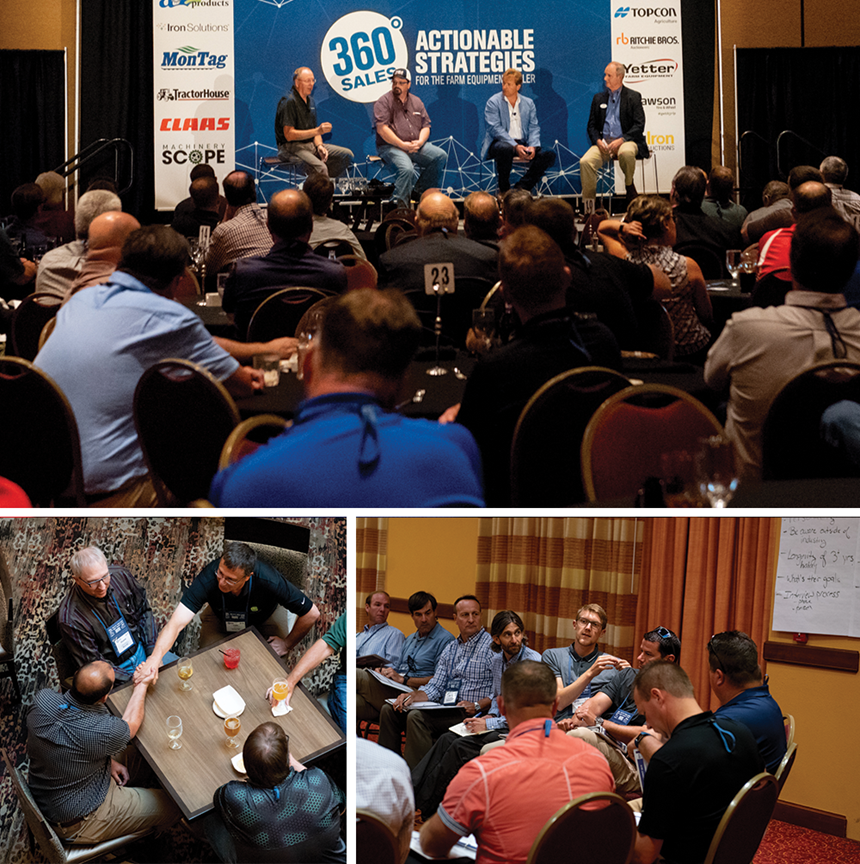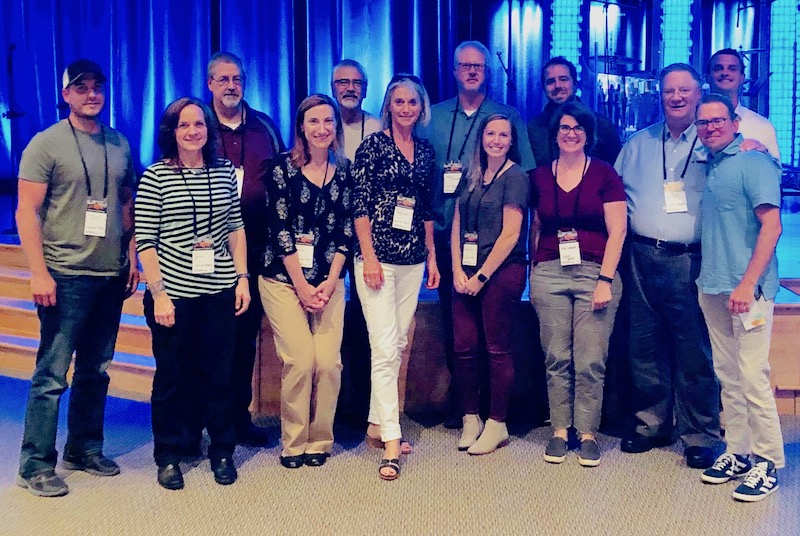Last Friday, 13 of us from Lessiter Media (publisher of Farm Equipment) attended the Global Leadership Summit. Less than a week after running our two events in Peoria, Ill., including the Dealership Minds Summit (DMS) and the National Strip Tillage Conference, it was good to be on “the other side” as attendees.

2019 Farm Equipment Dealership Minds Summit
“A society grows great when old men plant trees whose shade they know they shall never sit in.”
— Greek Proverb
And as I hope many of you felt after attending the events in Peoria, our group of 13 is still operating in that “high of opportunity” that occurs after getting together with peers — peers focused enough to devote 2 full days to become better at what they do.
I won’t recap the DMS here (watch your email and subscription for updates in coverage and select video presentations). Rather, I’m going to share a handful of observations from the Global Leadership Summit (GLS), which we’ve sent staff to for the last 3 years. (In full disclosure, Dave Kanicki is tasked with shepherding all of us for our key takeaways to present back to the company, so I’m getting a head start here on my 36 pages of notes...)

Lessiter Media/Farm Equipment Staff at 2019 Global Leadership Minds Summit: (left to right) Jeff Lazewski, Julia Gerlach, Dave Kanicki, Kristen Kubisiak, Christopher Nielsen, Ronda Iten, Mike Lessiter, Tory Terrill, Luke Weigel, Kim Schmidt, Patrick Sharpe, Kevin Reitz and Jack Zemlicka.
“There is no improving the future without disturbing the present.”
— Catherine Booth, Salvation Army Founder
Before I do, I’ve got to say a few words about pulling up, getting away from work and working on the business with your team — at a conference of any sort. Yes, it was 208 hours of labor invested. Yes, the work piles up when we’re out and we must rely on the team back at the ranch to cover for each other. But with the team-building, the conversations at the breaks/lunch and now in our presentation recaps, I’m sure it’ll ROI. We’ve said before that our company can only improve if the team is continuously improving, and I suspect your business is no different.
The GLS could be boiled down to “When leaders get better, everyone wins.” But you and I know that leadership takes work, perseverance and investment. And there are days when doubt sets in (perhaps an important trait of any leader). But as we learned from numerous presenters, “you don’t fail unless you quit ... or go in the ground.”
Here’s a short list of 7 takeaways for you in the farm equipment business:
“Vision is the art of seeing what is invisible to others”
— Jonathan Swift
- Use Constraints to Your Advantage. Craig Groeschel illustrated what’s possible when time is removed from the equation, which reminded me of stories of Apple and others mountain-moving accomplishments when failure is not an option. “If you have only 2 weeks to do something, you go with what you have and know, not stumbling over what you don’t have,” he says.
-
Leadership Motives: What’s Yours? Patrick Lencioni says C-suite type leaders fall into one of two camps: responsibility-based (servant leaders) and reward-centered (money, power, ego, etc.). “If you’re in it for the reward, it doesn’t work,” he says. In fact, he maintains that the word “servant leader” should someday cease to exist from business vocabularies, because it should be synonymous with the word leadership.
As a way of illustrating how a reward-based leader operates, Lencioni cited 5 things that they won’t do. They don’t like to do the following:- have uncomfortable conversations
- manage direct reports
- run great meetings
- work on team building
- reinforce or repeat themselves.
- “Burn the Ships!” Citing the words of the conquistador Hernan Cortes upon landing in Mexico, Groeschel shared the success that accompanies true commitment. “No excuses, no retreat, selling yourself out for the cause.” I also find this notion applies to change, technology and old habits — clean breaks remove psychological obstacles.
- How Will You Do Battle? Who was most feared in medieval England? “The greatest swordsman in England isn’t afraid of the second-greatest swordsman,” says Ben Sherwood. “He is afraid of the English farmer with the pitchfork who has nothing to lose.” Sherwood shared a study of 200 conflicts in which one party wielded 10 times more power as the other. When conventional tactics were used, the stronger party won 71.5% of the time. When unconventional tactics were used, the weaker party won 63.6% of the time. In other words, young David had a nearly two-thirds chance of slaying the Philistine giant by taking the fight to the opponent in a different way.
- Millennial Myths. I’m tired of the complaint parties on millennials (though I admit I’ve participated in the past). This session was the best and most productive session I’ve ever heard on workforce generations (Boomers as well as Generations X, Y or Millennials and Z). Jason Dorsey explained that each generation has a natural relationship with technology that’s invisible until one is asked to interact with another generation. “Technology is only new if you remember the way it was done before,” he says. To understand the gaps among generations, you’ve got to get into the pit with them, and work it. It’s a two-way street and the quicker we understand what they don’t know or don’t yet understand, the better.
- Reward the Rejection. In one of the most entertaining business presentations I’ve ever heard, Jia Jang shared his personal study of seeking out rejection and its role in professional growth. We found a 15-minute version on this presentation on YouTube:
- 4 Stages of Competence. In a presentation on determination, Liz Bohannon walked attendees through the hierarchy of competence model, which starts with unconscious incompetence (“you don’t know what you don’t know”) and ends at the much-desired stage of unconscious competence (“so good you can do it in your sleep.”) Thanks to George Russell, we’d all heard about it and its application for farm equipment dealers just a week before at a special presentation during the DMS.
“A bad leader’s influence dies with them. A great leader’s influence echoes for generations.”
— Todd Henry
Looking for a great shared experience with your managers and valued precision farming team? Make sure you save the date on your January calendar for the Precision Farming Dealer Summit.






